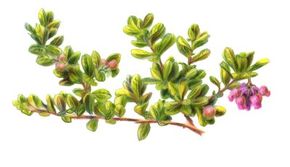This herb is also known as bearberry, kinnikinnick, and arbutus. Arcto is Greek for "bear," and staphylos is Greek for "a bunch of grapes"; indeed, the pink-red berries of uva ursi are a favorite food of bears.
Because uva ursi leaves often were mixed with tobacco and other herbs, the plant also is known as kinnikinnick, a Native American word that means "smoking mixture." Despite its smoky name, its effect is typically a calming one: In fact, uva ursi is used to treat uncomfortable urinary issues.
Advertisement
Uses for Uva Ursi
Uva ursi is used primarily to treat urinary problems, including bladder infections. The herb is disinfecting and promotes urine flow. Uva ursi is particularly recommended to treat illnesses caused by Escherichia coli (E. coli), a bacterium that lives in the intestines and commonly causes bladder and kidney infections.
The glycoside arbutin is the main active constituent in uva ursi. Arbutin treats urinary problems most effectively when the urine is alkaline. For kidney infections or kidney stones, take the herb under the care of a naturopathic or other trained physician. There is some indication that the herb may also be effective against certain yeast (such as Candida species).
Uva ursi is recommended for pelvic pain that is cramping, heavy, and dragging. The herb is particularly indicated for chronic complaints, although it should not be used over a long time. Use it for chronic irritation, pain, mucus production, and weakness of urinary organs.
In the next section, you will learn how to prepare uva ursi for herbal remedies and some of the potentially dangerous side effects.
To learn more about treating common medical conditions at home, try the following links:
- For an overview of all of our herbal remedies, go to the main Herbal Remedies page.
- To learn more about treating medical conditions at home, visit our main Home Remedies page.
- One of the best things you can do for your health and well being is to make sure you are getting enough of the vital nutrients your body needs. Visit our Vitamins page to learn more.
This information is solely for informational purposes. IT IS NOT INTENDED TO PROVIDE MEDICAL ADVICE. Neither the Editors of Consumer Guide (R), Publications International, Ltd., the author nor publisher take responsibility for any possible consequences from any treatment, procedure, exercise, dietary modification, action or application of medication which results from reading or following the information contained in this information. The publication of this information does not constitute the practice of medicine, and this information does not replace the advice of your physician or other health care provider. Before undertaking any course of treatment, the reader must seek the advice of their physician or other health care provider.Before engaging in any complementary medical technique, including the use of natural or herbal remedies, you should be aware that many of these techniques have not been evaluated in scientific studies. Use of these remedies in connection with over the counter or prescription medications can cause severe adverse reactions. Often, only limited information is available about their safety and effectiveness. Each state and each discipline has its own rules about whether practitioners are required to be professionally licensed. If you plan to visit a practitioner, it is recommended that you choose one who is licensed by a recognized national organization and who abides by the organization's standards. It is always best to speak with your primary health care provider before starting any new therapeutic technique.
Advertisement
